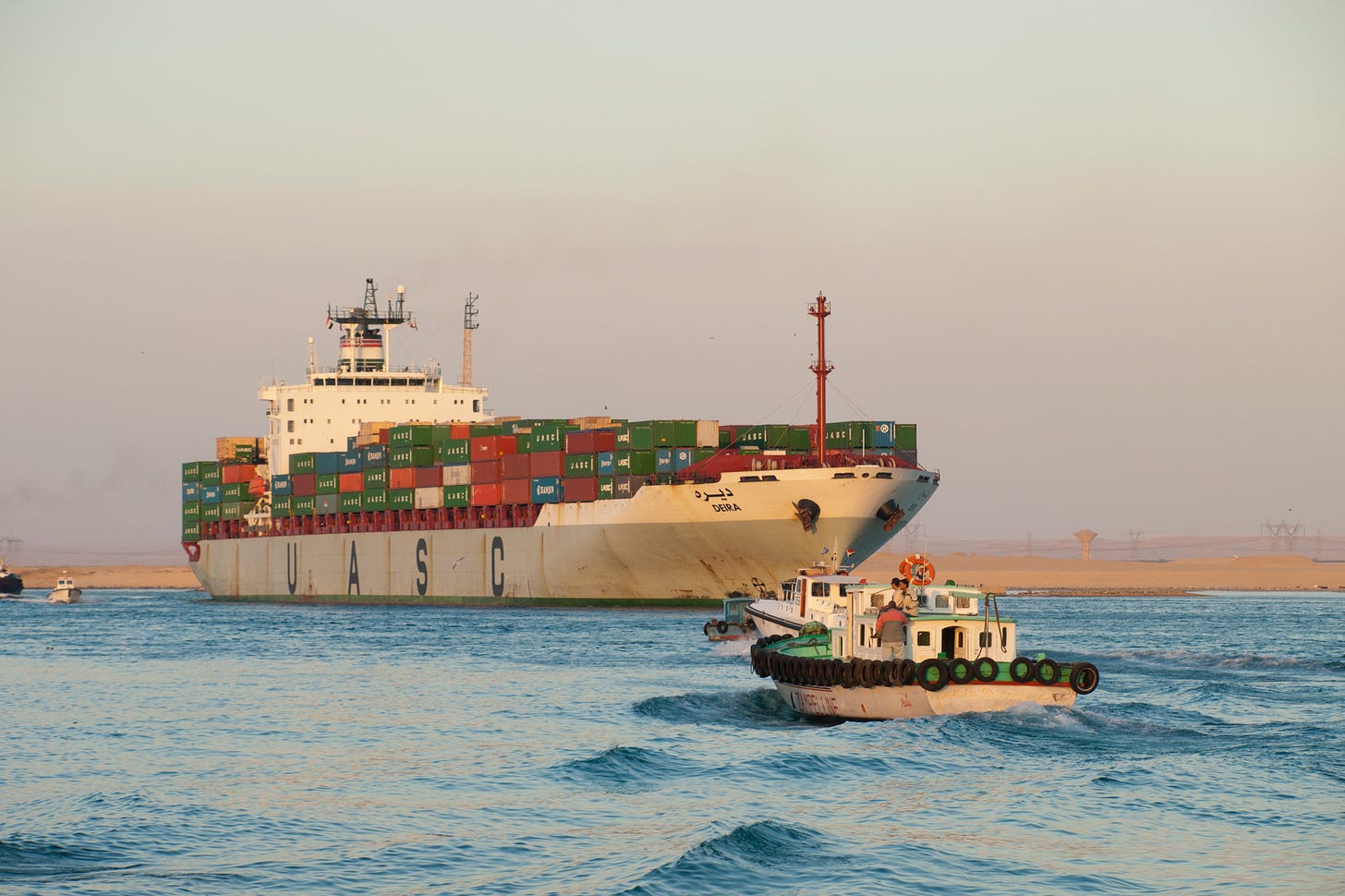Emerging Markets Daily - January 5
Protests Rock Kazakhstan as Cabinet Resigns, China Mobile in Shanghai Debut, UAE Forecasts 4.2% Growth, Tencent Eyes Metaverse, Suez Canal Breaks Revenue Record
The Top 5 Stories Shaping Emerging Markets from Global Media - January 5
Kazakh Protesters Torch Public Buildings, Cabinet Resigns
“The Cabinet resigned, but that failed to quell the anger of the demonstrators, who have taken to the streets in response to a fuel price increase from the start of the new year. Though the unrest was triggered by the price rise, there were signs of broader political demands in a country still under the shadow of three decades of one-man rule.”
Nikkei Asia/Reuters
“Kazakhstan declared emergencies in the capital, main city and provinces on Wednesday after demonstrators stormed and torched public buildings, the worst unrest for more than a decade in the tightly controlled country.”
“The Cabinet resigned, but that failed to quell the anger of the demonstrators, who have taken to the streets in response to a fuel price increase from the start of the new year. Though the unrest was triggered by the price rise, there were signs of broader political demands in a country still under the shadow of three decades of one-man rule.”
“Nursultan Nazarbayev, 81, took office as president of the former Soviet republic in 1990 and only stepped down in 2019. He retained authority as ruling party boss and head of a powerful security council.”
“An Instagram livestream by a Kazakh blogger showed a fire blazing in the office of the mayor of the main city, Almaty, with apparent gunshots audible nearby. Videos posted online also showed the nearby prosecutor's office burning.”
“Nazarbayev's hand-picked successor, President Kassym-Jomart Tokayev, accepted the Cabinet's resignation on Wednesday and ordered acting ministers to reverse the fuel price rise.”
“Kazakhstan's reputation for political stability under Nazarbayev has helped it attract hundreds of billions of dollars of foreign investment in its oil and metals industries. The unrest saw the price of Kazakhstan's dollar bonds plunge by nearly 6 cents, the worst showing since the height of the coronavirus market collapse of 2020.”
“Analysts said the veneer of stability has masked anger among a younger generation denied the liberalization seen in other ex-Soviet states.”
“Atameken, Kazakhstan's business lobby group, said its members were reporting attacks on banks, stores and restaurants. The city health department said 190 people had sought medical help, including 137 police. City authorities urged residents to stay home.” Nikkei Asia/Reuters report.
China Mobile Makes its Debut in Shanghai After $9 Billion Stock Sales
Wall Street Journal
“Eight months after China Mobile Ltd. was booted from the New York Stock Exchange, the giant cellphone carrier made its debut in Shanghai on Wednesday after raising close to $9 billion in a blockbuster homecoming listing.”
“Shares of the state-owned mobile operator closed slightly above their Shanghai stock-offering price of 57.58 yuan, the equivalent of $9.06, after climbing earlier in the day.”
“While the first-day move wasn’t large, China Mobile’s newly listed shares traded at more than a 40% premium to the price of the company’s existing Hong Kong-listed shares, which rose 3.3% on Wednesday.”
“That gap reflects how investors in mainland China’s market, dominated by individual investors, have attached a much higher valuation to the 24-year-old company. As of Wednesday’s market close, China Mobile’s market capitalization was more than $130 billion, according to calculations by data provider Wind.”
“China Mobile is the country’s largest wireless carrier by revenue and subscribers, with more than 950 million customers as of September. The Beijing-based company and two smaller rivals, China Telecom Corp. and China Unicom (Hong Kong) Ltd. , had to give up their U.S. listings in May after they were added to an investment blacklist that bars Americans from investing in Chinese companies alleged to help China’s military, and intelligence and security services.”
“Last month, China Mobile raised the equivalent of $8.8 billion from its domestic share offering, making it the biggest listing in the Chinese onshore market in the past decade and the fifth-largest ever, according to Wind data. The four larger domestic deals were from state-owned banks and state-owned energy companies in 2007 and 2010.” WSJ reports.
UAE Sees 4.2% Growth in 2022, Fueled By Oil Rebound
Bloomberg
“The United Arab Emirates expects its economy to grow 4.2% in 2022, supported by a rebound in oil. Growth in the oil sector’s gross domestic product is set to be at 5% this year, an increase from last year’s 2% contraction, according to preliminary data from the country’s central bank. Non-oil GDP is expected to remain in line with 2021.”
“…Gulf countries, including the UAE, were dealt with a double whammy in 2020 as the spread of the coronavirus pandemic was accompanied by a drop in crude prices, the main source of income for the region. Last year, sentiment was better as travel restrictions eased and Dubai’s Expo 2020 was launched, attracting millions of visitors.”
“The UAE’s daily virus cases have increased to more than 2,000 in recent days, however, a sharp rise from below 100 cases less than a month ago. The International Monetary Fund expects the UAE’s economy to grow more than 3% this year and hover around the same levels into 2026 at least.” Bloomberg reports.
Tencent Divests from Major Tech Companies, Eyes Metaverse and NFTs
South China Morning Post
“Plans from Tencent Holdings, China’s largest social media and video gaming company, to sell its stake in Singapore-based e-commerce giant Sea Limited hot on the heels of offloading JD.com stock has lead to investor fears of greater divestment in mature technology firms, aligning with the government’s continued antitrust campaign as it seeks opportunities in new areas.”
“The divestment has raised questions about Tencent’s sprawling investments across a wide variety of companies. These holdings amount to US$130 billion, with US$80 billion held in publicly listed companies, according to Bloomberg Intelligence analyst Matthew Kanterman, citing Bloomberg data.”
“The tech giant, with an empire that touches the digital lives of nearly all of China’s 1 billion internet users, remains a principal investor in Pinduoduo, holding a 15.6 per cent stake, according to the social e-commerce company’s annual report in April 2021. Tencent also owns 19.4 per cent of Meituan, according to the on-demand delivery firm’s filing for the quarter ended September.”
“‘Sea is a relatively mature, stable and financially self-sustaining business, and doesn’t necessarily need Tencent’s expertise anymore to execute on its goals,’ Kanterman said. ‘Plus, from the levels at which Tencent has invested, there’s a big gain. So it makes sense for Tencent to consider exiting businesses such as Sea and JD.com that check those boxes.’”
“Tencent announced on Tuesday evening that it would sell a US$3 billion stake in Sea, Southeast Asia’s most valuable internet company that operates e-commerce platform Shopee and gaming arm Garena, reducing its holdings from 21.3 per cent to 18.7 per cent and its voting power to below 10 per cent. The announcement comes two weeks after Tencent said it would sell a US$16 billion stake in JD.com, China’s second-largest e-commerce company after Alibaba Group Holding…”
“Meanwhile, Tencent has been investing in the two buzziest tech trends of 2021: the metaverse and non-fungible tokens (NFTs). The metaverse, a concept of an immersive 3D space considered by some to be the next iteration of the internet, has attracted huge investments in the video gaming industry.” SCMP reports.
Suez Canal Hits Record Revenue in 2021
Egypt Today/ Al Masry Al Youm
“The Head of the Suez Canal Authority Osama Rabie announced Sunday that the navigation statistics in the canal for 2021 set new and unprecedented records, achieving the highest annual revenue in the history of the canal at a total of US$ 6.3 billion.”
“The largest annual net tonnages at the canal was over 1.27 billion tons, exceeding everything registered before. Rabie said that the navigation movement in the canal in 2021 saw 20,694 ships crossing from both directions compared to 18,830 ships during the year 2020, an increase of 1,864 ships – a 10 percent rise – while the canal had recorded a total net tonnage of 1.17 billion tons during 2020, an increase of 100 million tons at 8.5 percent.”
“The Suez Canal’s revenues in 2021 achieved a significant increase of 12.8 percent of its revenues in dollars, as the revenues of the Canal recorded US$6.3 billion, compared to US$ 5.6 billion during 2020, an increase of US$ 720 million.”
“Container ships transiting the canal increased by 10.1 percent to reach a total of 5,186 ships compared to 4,710 in 2020, while bulk ships rose by 15.3 percent, with 5,893 ships compared to the transit of 5,113 last year.” Egypt Today reports.
“We are what we pretend to be, so we must be careful about what we pretend to be.”
― Kurt Vonnegut





